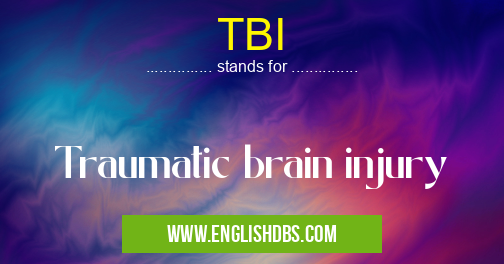What does TBI mean in THERAPEUTICS
Traumatic brain injury (TBI) is a serious public health problem, affecting millions of people worldwide each year. TBI can range in severity from mild to severe, and can have a significant impact on a person's physical, cognitive, and emotional health.

TBI meaning in Therapeutics in Medical
TBI mostly used in an acronym Therapeutics in Category Medical that means Traumatic brain injury
Shorthand: TBI,
Full Form: Traumatic brain injury
For more information of "Traumatic brain injury", see the section below.
» Medical » Therapeutics
What is TBI?
TBI is caused by a blow or jolt to the head that disrupts the normal function of the brain. This can happen in a variety of ways, including:
- Falls
- Motor vehicle accidents
- Sports injuries
- Assaults
- Military combat
TBI can cause a wide range of symptoms, including:
- Mild TBI: Headache, nausea, vomiting, confusion, dizziness
- Moderate TBI: Loss of consciousness, seizures, difficulty speaking or understanding speech, weakness or paralysis on one side of the body
- Severe TBI: Coma, permanent disability, death
How is TBI diagnosed?
TBI is diagnosed based on a person's symptoms and a physical examination. A doctor may also order tests, such as a CT scan or MRI, to confirm the diagnosis and assess the extent of the injury.
How is TBI treated?
There is no cure for TBI, but treatment can help to manage the symptoms and improve a person's quality of life. Treatment may include:
- Medications to relieve pain, nausea, and seizures
- Physical therapy to improve mobility and strength
- Occupational therapy to help people learn how to perform everyday tasks
- Speech therapy to help people improve their communication skills
- Cognitive rehabilitation to help people improve their memory, attention, and problem-solving skills
Essential Questions and Answers on Traumatic brain injury in "MEDICAL»THERAPEUTICS"
What is a traumatic brain injury (TBI)?
A traumatic brain injury (TBI) occurs when an external force causes damage to the brain. This can happen from a blow to the head, a jolt to the body, or a penetrating injury. The severity of a TBI can range from mild to severe, and can cause a wide range of symptoms, including: loss of consciousness, confusion, memory loss, impaired speech, and difficulty with balance and coordination.
What are the different types of traumatic brain injuries?
There are two main types of traumatic brain injuries: closed head injuries and open head injuries. Closed head injuries occur when the skull is not fractured, while open head injuries occur when the skull is fractured and the brain is exposed. Closed head injuries are more common than open head injuries, and are typically less severe. However, open head injuries can be very serious and can lead to permanent disability or death.
What are the symptoms of a traumatic brain injury?
The symptoms of a traumatic brain injury can vary depending on the severity of the injury. Mild TBIs may only cause temporary symptoms, such as headache, nausea, and vomiting. More severe TBIs can cause more serious symptoms, such as loss of consciousness, confusion, memory loss, impaired speech, and difficulty with balance and coordination. In some cases, TBIs can also cause permanent disability or death.
What causes a traumatic brain injury?
Traumatic brain injuries can be caused by a variety of factors, including: falls, motor vehicle accidents, sports injuries, and assaults. Falls are the leading cause of TBIs in children, while motor vehicle accidents are the leading cause of TBIs in adults.
How is a traumatic brain injury diagnosed?
A traumatic brain injury is diagnosed based on a physical examination and a patient's symptoms. The doctor may also order imaging tests, such as a CT scan or MRI, to confirm the diagnosis and assess the severity of the injury.
Final Words: TBI is a serious injury that can have a significant impact on a person's life. However, with proper treatment, people with TBI can make a full or partial recovery. It is important to be aware of the signs and symptoms of TBI and to seek medical attention immediately if you think you may have sustained a head injury.
TBI also stands for: |
|
| All stands for TBI |
